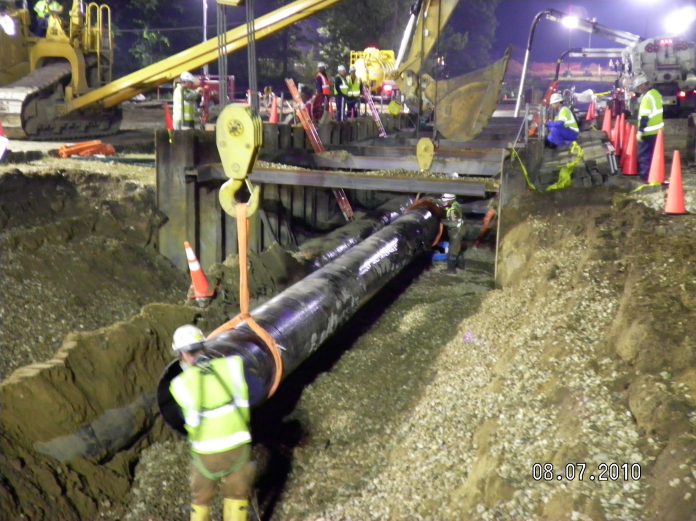A much-delayed natural gas pipeline has been approved by a key federal regulator after other agencies pulled permits.
The U.S. Federal Energy Regulatory Commission (FERC) has approved the Mountain Valley Pipeline’s (MVP) request to change the construction method it will use to cross about 180 streams and wetlands in Virginia and West Virginia.
The MVP is designed to transport 2 billion cubic feet per day of domestic natural gas into regional and national supply markets, and is already fully subscribed with purchasers.
FERC issued an order amending the pipeline’s 2017 certificate to allow developers to bore under some bodies of water instead of using the open-cut method originally planned.
‘Fewer Environmental Impacts’
The MVP’s proposed method for crossing water bodies will have fewer environmental impacts than the method sanctioned by FERC in its original certificate, said FERC Chairman Richard Glick and Commissioner Allison Clements, in a joint statement.
“Mountain Valley’s usage of trenchless waterbody crossings will result in fewer environmental impacts than the crossing method that the Commission approved under the original certificate, meaning that today’s order amending Mountain Valley’s certificate will almost certainly represent an improvement over the status quo,” said Glick and Clements.
MVP was delayed for years as federal agencies, such as the U.S. Forest Service, Bureau of Land Management, and Fish and Wildlife Service, pulled their approvals after litigation by environmental groups and two federal court decisions.
If regulators follow the FERC’s lead, the project could be back on track, ClearView Energy Partners LLC, an investment research firm, told its clients, reported E&E News. “If a similar stance [to FERC’s] is adopted by other federal agencies, we think that the project could be in service by mid-2023, the early end of the range we had been eyeing for its completion,” said ClearView.
‘Critical Infrastructure Project’
FERC’s approval of MVP’s plan is good for America, said Natalie Cox, a spokesperson for MVP in a statement, reported E&E News.
“This is another important step forward in [MVP]’s project completion and, as a critical infrastructure project, is essential for our nation’s energy security, reliability, and ability to transition to a lower-carbon future,” said Cox.
FERC’s approval will help the United States help Europe wean itself from Russian gas, but the Biden administration needs to do more, said Sen. Joe Manchin (D-WV) in a tweet praising FERC’s decision.
“[MVP is a] strategically important project for the energy and national security of our country and will play a critical role in our ability to support our European allies as they eliminate their use of Russian energy,” Manchin tweeted. “Unfortunately, there are still several additional steps that need to be taken by the [Biden] Administration to get this critical project—which would put an additional two billion cubic feet of natural gas [per day] into the market within a matter of months—complete.”
‘Lower Electricity Prices’
Beyond MVP’s approval, the Biden administration needs to take even more actions to accelerate gas production and delivery in order to moderate high energy prices, says Tim Benson, senior policy analyst with The Heartland Institute, which publishes Environment & Climate News.
“Despite the truly remarkable increase in natural gas production that has taken place in the United States over the last decade-plus, infrastructure development has not proceeded at a satisfactory pace, which has driven up gas prices and electricity costs,” said Benson. “Higher electricity costs disproportionally hurt low-income families, who naturally spend a larger percentage of their money keeping the lights on.
“Adding additional pipeline infrastructure like the MVP should lower electricity prices, thereby raising living standards, stimulating long-term economic growth and creating a substantial net increase in jobs,” said Benson.
Kenneth Artz (KApublishing@gmx.com) writes from Dallas, Texas.


























